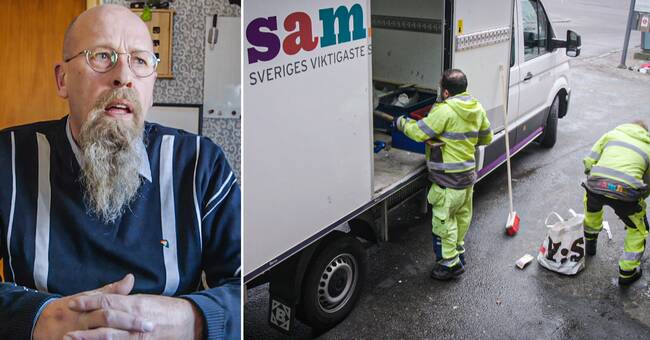Samhall calls itself "Sweden's most important company".
They claim to be the country's largest service provider with over 4,000 customers and services in areas such as cleaning, warehousing and logistics.
Every year, you receive around SEK 6 billion in state support.
The money will go to offering jobs to people with such extensive disabilities that they can not get any other work in the labor market.
But several people with transparency say that the very weakest no longer get the jobs.
"More business that governs"
Urban Nyman started at Samhall in the early 2000s.
He has been both business manager and area manager, with direct responsibility over the target group with disabilities.
He saw a change within the company.
- They never talked about disabilities or functional variations, there were constant discussions about new business and finances.
That was the big focus, the last ten years it increased gradually.
So they tried, from Samhall's side, to find people who actually have as few disabilities as possible who can do the jobs as well as possible.
After 18 years as manager, he chose to resign when he, as he puts it, had had enough.
- When you read that Samhall will employ those with the greatest need - you absolutely do not.
It is more the business that governs who you bring in than the person's needs, he says.
Would map jobseekers
The jobs that Samhall offers must be adapted to the employees' reduced working capacity.
But there must also be real jobs in demand in the market.
When Arbetsförmedlingen assigns people to Samhall, they say that it takes place in dialogue with the company.
But former employees tell Uppdrag granskning that Samhall themselves have been able to choose who will be allowed to work.
Jimmy Wallmo, former long-term area manager in Stockholm, says that he and other area managers went to recruitment meetings at the Swedish Public Employment Service to interview and map jobseekers.
- We had a list that we would check off on reservations and we had the message "just strong stand and walk".
No weak employees for these must be matched into these assignments, he says.
How did it feel to do that screening. You sat as an employee at Samhall and sifted out weak people?
- It's always easy to say afterwards that "damn, why did I do this".
But you have to remember that if we were to take out the wrong employees, for example weaker people, we would send them to a colleague who would not be able to do his job, which made you sit there with a responsibility.
"It's very unfortunate"
Cecilia Schelin Seidegård, chairman of the board of Samhall, says that it is the Swedish Public Employment Service that has the task of selecting employees - and that she does not recognize that area managers have used lists with the call to take the strongest people.
- It's very unfortunate.
We have a very good collaboration with the Swedish Public Employment Service, and we must of course raise this with the Swedish Public Employment Service, because that is not how it should go.
I do not think it happens in many cases, but one case is one too many.
Maria Kindahl, deputy business area manager at the Swedish Public Employment Service, says that she does not recognize the picture either, but that it may be about information meetings.
- It is important that those people receive information about what it is like to work at Samhall, "what do I say yes to if I say yes to a job?", She says.
Then Samhall has an opportunity to influence that decision?
- Arbetsförmedlingen instructs.
These are people with disabilities, but it is also important that there are good tasks for this individual.
Taken in subcontractors
Last week, Dagens Arbete published a review of how young people with disabilities are not placed at Samhall.
As early as 2017, the State Treasury also stated in a report that Samhall sets requirements for who should be employed.
But it's not just about Samhall having chosen stronger people over weak ones.
Via sources and agreements that Assignment review has been informed of, it appears that Samhall has hired subcontractors on several occasions to handle assignments.
Jasmine Lindkvist, former key account manager at Samhall, says that this is because it has not been possible to ensure that there have been staff who have been able to clean at customers who have bought Samhall's services.
- What they solved was to bring in subcontractors who helped, especially in the Stockholm region, they picked a subcontractor who got a lot of stores, she says.
Samhall believes that the criticism that they prioritize business is strongly misleading and says that the assignments are important to be able to offer real jobs.
The government has commissioned the Swedish Public Employment Service to investigate whether it is the right people who end up at Samhall and how instructions actually go.
The result must be reported within one year.
The Government has also amended the Swedish Public Employment Service's ordinance so that it is made clearer that sheltered employment may only be given to those who have a disability.
The report "Too weak for Samhall" can be seen on SVT Play.

